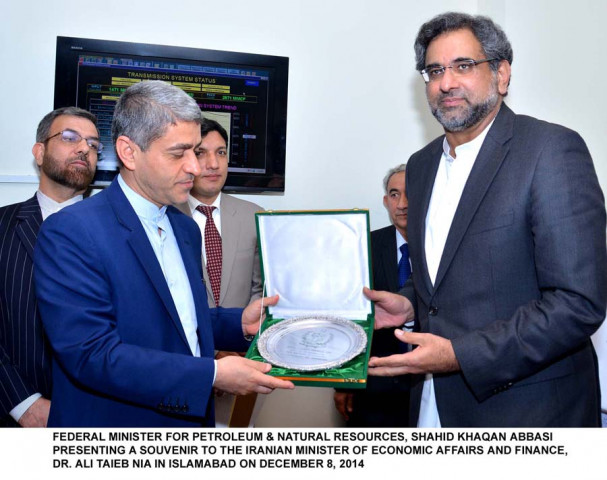Sanctions on Iran holding back IP gas pipeline project: Abbasi
Ishaq Dar says export of food items to Iran should be on till the sanctions are relaxed

The IP gas pipeline project is vital for the Pakistan’s energy needs and the government is fully committed to complete the project, Abbasi told the visiting Iranian delegation in Islamabad on Monday. However, he pointed out that banks, international contractors and equipment suppliers were not ready to get involved in the project owing to international sanctions on Iran.
But it was not all bad news for Iranian Economic Affairs and Finance Minister Dr Ali Taieb Nia. Abbasi told them that Pakistan was planning to complete the project in two steps.
The first step would include installing an LNG terminal at Gwadar Port, and laying a 42-inch, 700km long pipeline from Gwadar to Nawabshah for transferring gas to northern parts of the country.
The minister informed the Iranian delegation that they were in negotiations with Chinese companies to construct this section of the pipeline.
The remaining 70 km-long section of the pipeline, from Gwadar to the Iranian border, will be completed by Pakistani companies.
Nia said that Iran had already completed its part of the gas pipeline, and hoped that Pakistan will also fulfill its commitment.
Abbasi said that Pakistan wants to increase bilateral trade and economic ties in sectors other than LPG, oil and gas, as well.
The Iranian minister said that their negotiations with the international community on the nuclear issue were successful and that they hoped that sanctions will soon be lifted.
Abbasi said that Pakistan’s annual oil imports bill is $15 billion but direct oil trade between Iran and Pakistan is negligible, adding that he expected it to increase substantially once the sanctions are lifted.
Pakistan, Iran to trade food items
While international sanctions may have put a halt to formal trade between Pakistan and Iran, the two countries on Monday resolved to continue trade of food items till sanctions are relaxed.
“At least export of food items to the friendly country should be on till the sanctions are relaxed”, Finance Minister Ishaq Dar said as a two day Pakistan-Iran Joint Economic Commission commenced in Islamabad on Monday.
The 19th meeting of the Commission is being attended by a high-powered Iranian delegation led by the Iranian Minister for Economic Affairs and Finance Dr Ali Taieb Nia.
Before the formal inauguration of the session, both ministers held a bilateral meeting along with their respective delegations where they resolved to take economic relations a step further particularly focusing on trade promotion.
“The top leadership of both the countries is serious in taking the relationship to a new level; we have endeavoured to materialise what our leadership feels. We will not only try to expand the existing trade, economic and bilateral ties in other areas but also make efforts to stabilise them,” Dar said.
Regarding the sanctions on Iran, Dar said that Pakistan supports its western neighbor on the International fora and will argue with the world community to open trade with Iran, at least on humanitarian goods.
Iranian minister expressed the resolve for cooperate with Pakistan in areas of energy import, transport and communication, mining, agriculture, health and banking sector development, through a comprehensive framework agreement.
The two sides reviewed bilateral trade and proposals for its enhancement, tariff and non-tariff barriers, hampering bilateral trade, opening of bank branches, revitalisation of joint business council, visa facilitation for businessmen of Pakistan and lifting of a ban on import of fruits from Pakistan.
Other subjects that the JEC is expected to consider include banking problems with Iran due to sanctions imposed by US and UN etc. Discussions are also expected to be held on Iran Pakistan gas pipeline project( to expedite its implementation), up gradation of Quetta-Taftan railway track and improvement of Noshki-Dalbandin section of N-40 highway. Further, out of the 12 MoUs under consideration, four are expected to be signed during the current JEC.
Of the energy import projects with Iran which will be discussed during the JEC include: import of 74MW power from Iran for Makran Division, Balochistan; import of 100MW from Iran for Gwadar; import of 1,000MW from Iran for Balochistan and the national grid.
Iranian finance minister meets Sartaj Aziz
Meanwhile, Adviser to the Prime Minister on National Security and Foreign Affairs Sartaj Aziz also met at the Foreign Office, and discussed bilateral relations between the two neighbours.
Aziz underlined Pakistan’s commitment to strengthen Iran-Pak ties and described Prime Minister Nawaz Sharif’s visit to Iran in May 2014 as a “milestone”.
The adviser particularly noted the role of the Pakistan-Iran Business Council in visa facilitation, opening of new border crossing points, and border markets.


















COMMENTS
Comments are moderated and generally will be posted if they are on-topic and not abusive.
For more information, please see our Comments FAQ